Organisational Behaviour Report: Tesco, Culture, Power, Politics
VerifiedAdded on 2021/02/22
|13
|4227
|59
Report
AI Summary
This report provides an in-depth analysis of organisational behaviour within Tesco, a multinational retailer. It explores how organisational culture, power dynamics, and political influences affect individual and team performance. The report examines Handy's culture model, various types of power (coercive, reward, legitimate, referent, and expert), and the impact of organisational politics. Furthermore, it delves into content and process theories of motivation, including Maslow's hierarchy of needs, McClelland's learned needs theory, and Vroom's expectancy theory. The analysis highlights the importance of motivation in achieving organisational goals and provides insights into how Tesco can leverage these concepts to enhance employee performance and achieve greater success. The report concludes with a discussion on effective team dynamics and the application of organisational behaviour principles within the context of Tesco's operations.
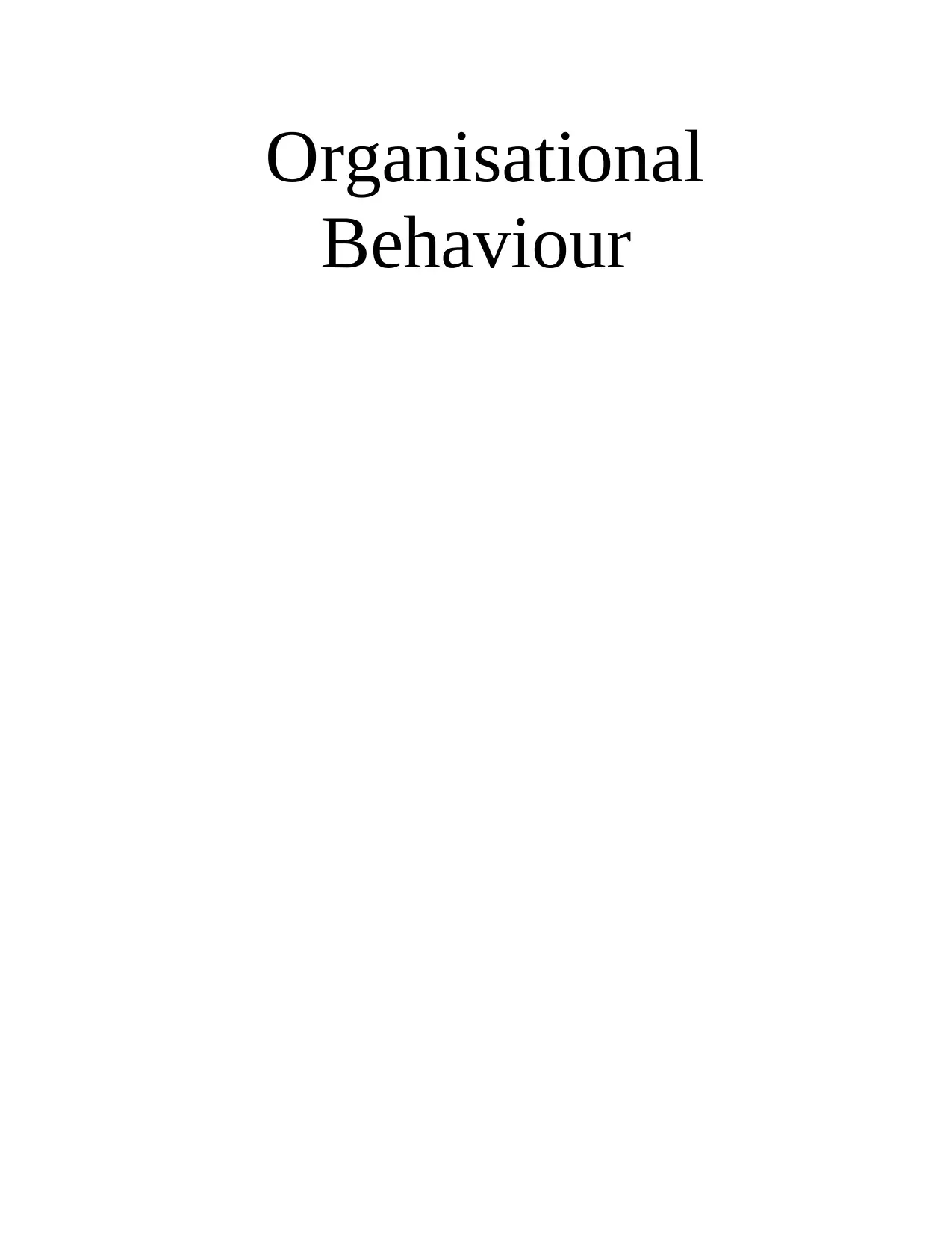
Organisational
Behaviour
Behaviour
Paraphrase This Document
Need a fresh take? Get an instant paraphrase of this document with our AI Paraphraser
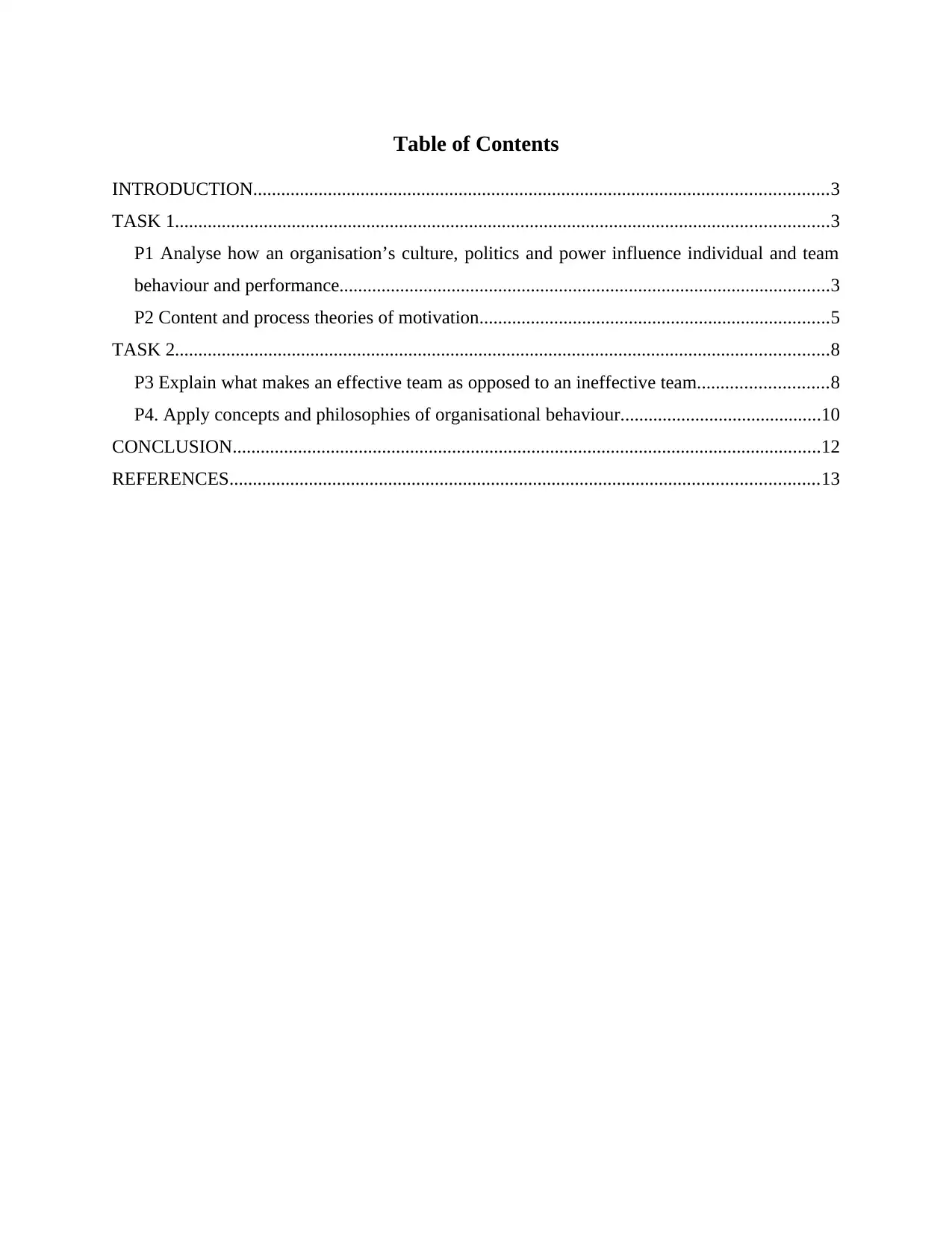
Table of Contents
INTRODUCTION...........................................................................................................................3
TASK 1............................................................................................................................................3
P1 Analyse how an organisation’s culture, politics and power influence individual and team
behaviour and performance.........................................................................................................3
P2 Content and process theories of motivation...........................................................................5
TASK 2............................................................................................................................................8
P3 Explain what makes an effective team as opposed to an ineffective team............................8
P4. Apply concepts and philosophies of organisational behaviour...........................................10
CONCLUSION..............................................................................................................................12
REFERENCES..............................................................................................................................13
INTRODUCTION...........................................................................................................................3
TASK 1............................................................................................................................................3
P1 Analyse how an organisation’s culture, politics and power influence individual and team
behaviour and performance.........................................................................................................3
P2 Content and process theories of motivation...........................................................................5
TASK 2............................................................................................................................................8
P3 Explain what makes an effective team as opposed to an ineffective team............................8
P4. Apply concepts and philosophies of organisational behaviour...........................................10
CONCLUSION..............................................................................................................................12
REFERENCES..............................................................................................................................13
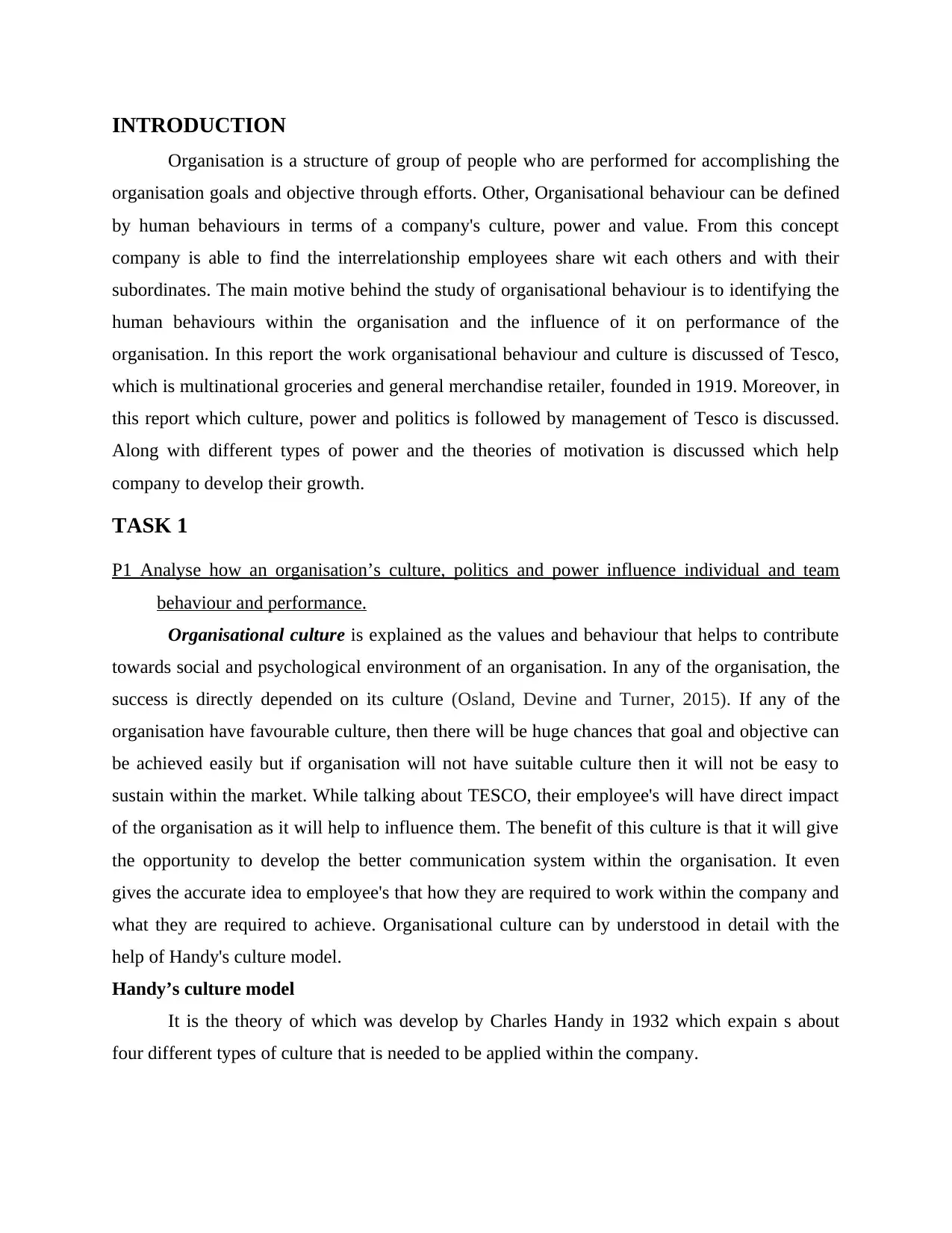
INTRODUCTION
Organisation is a structure of group of people who are performed for accomplishing the
organisation goals and objective through efforts. Other, Organisational behaviour can be defined
by human behaviours in terms of a company's culture, power and value. From this concept
company is able to find the interrelationship employees share wit each others and with their
subordinates. The main motive behind the study of organisational behaviour is to identifying the
human behaviours within the organisation and the influence of it on performance of the
organisation. In this report the work organisational behaviour and culture is discussed of Tesco,
which is multinational groceries and general merchandise retailer, founded in 1919. Moreover, in
this report which culture, power and politics is followed by management of Tesco is discussed.
Along with different types of power and the theories of motivation is discussed which help
company to develop their growth.
TASK 1
P1 Analyse how an organisation’s culture, politics and power influence individual and team
behaviour and performance.
Organisational culture is explained as the values and behaviour that helps to contribute
towards social and psychological environment of an organisation. In any of the organisation, the
success is directly depended on its culture (Osland, Devine and Turner, 2015). If any of the
organisation have favourable culture, then there will be huge chances that goal and objective can
be achieved easily but if organisation will not have suitable culture then it will not be easy to
sustain within the market. While talking about TESCO, their employee's will have direct impact
of the organisation as it will help to influence them. The benefit of this culture is that it will give
the opportunity to develop the better communication system within the organisation. It even
gives the accurate idea to employee's that how they are required to work within the company and
what they are required to achieve. Organisational culture can by understood in detail with the
help of Handy's culture model.
Handy’s culture model
It is the theory of which was develop by Charles Handy in 1932 which expain s about
four different types of culture that is needed to be applied within the company.
Organisation is a structure of group of people who are performed for accomplishing the
organisation goals and objective through efforts. Other, Organisational behaviour can be defined
by human behaviours in terms of a company's culture, power and value. From this concept
company is able to find the interrelationship employees share wit each others and with their
subordinates. The main motive behind the study of organisational behaviour is to identifying the
human behaviours within the organisation and the influence of it on performance of the
organisation. In this report the work organisational behaviour and culture is discussed of Tesco,
which is multinational groceries and general merchandise retailer, founded in 1919. Moreover, in
this report which culture, power and politics is followed by management of Tesco is discussed.
Along with different types of power and the theories of motivation is discussed which help
company to develop their growth.
TASK 1
P1 Analyse how an organisation’s culture, politics and power influence individual and team
behaviour and performance.
Organisational culture is explained as the values and behaviour that helps to contribute
towards social and psychological environment of an organisation. In any of the organisation, the
success is directly depended on its culture (Osland, Devine and Turner, 2015). If any of the
organisation have favourable culture, then there will be huge chances that goal and objective can
be achieved easily but if organisation will not have suitable culture then it will not be easy to
sustain within the market. While talking about TESCO, their employee's will have direct impact
of the organisation as it will help to influence them. The benefit of this culture is that it will give
the opportunity to develop the better communication system within the organisation. It even
gives the accurate idea to employee's that how they are required to work within the company and
what they are required to achieve. Organisational culture can by understood in detail with the
help of Handy's culture model.
Handy’s culture model
It is the theory of which was develop by Charles Handy in 1932 which expain s about
four different types of culture that is needed to be applied within the company.
⊘ This is a preview!⊘
Do you want full access?
Subscribe today to unlock all pages.

Trusted by 1+ million students worldwide
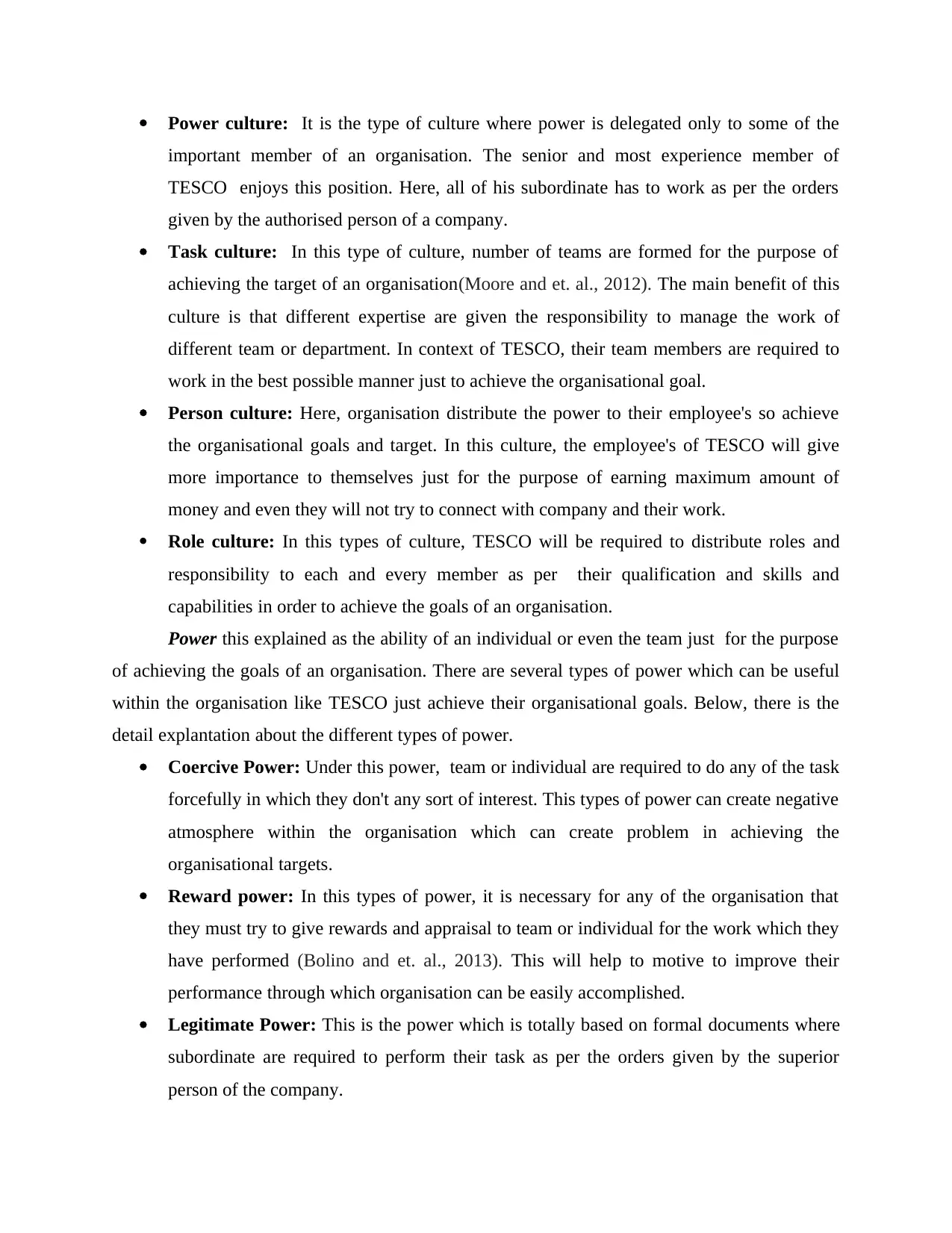
Power culture: It is the type of culture where power is delegated only to some of the
important member of an organisation. The senior and most experience member of
TESCO enjoys this position. Here, all of his subordinate has to work as per the orders
given by the authorised person of a company.
Task culture: In this type of culture, number of teams are formed for the purpose of
achieving the target of an organisation(Moore and et. al., 2012). The main benefit of this
culture is that different expertise are given the responsibility to manage the work of
different team or department. In context of TESCO, their team members are required to
work in the best possible manner just to achieve the organisational goal.
Person culture: Here, organisation distribute the power to their employee's so achieve
the organisational goals and target. In this culture, the employee's of TESCO will give
more importance to themselves just for the purpose of earning maximum amount of
money and even they will not try to connect with company and their work.
Role culture: In this types of culture, TESCO will be required to distribute roles and
responsibility to each and every member as per their qualification and skills and
capabilities in order to achieve the goals of an organisation.
Power this explained as the ability of an individual or even the team just for the purpose
of achieving the goals of an organisation. There are several types of power which can be useful
within the organisation like TESCO just achieve their organisational goals. Below, there is the
detail explantation about the different types of power.
Coercive Power: Under this power, team or individual are required to do any of the task
forcefully in which they don't any sort of interest. This types of power can create negative
atmosphere within the organisation which can create problem in achieving the
organisational targets.
Reward power: In this types of power, it is necessary for any of the organisation that
they must try to give rewards and appraisal to team or individual for the work which they
have performed (Bolino and et. al., 2013). This will help to motive to improve their
performance through which organisation can be easily accomplished.
Legitimate Power: This is the power which is totally based on formal documents where
subordinate are required to perform their task as per the orders given by the superior
person of the company.
important member of an organisation. The senior and most experience member of
TESCO enjoys this position. Here, all of his subordinate has to work as per the orders
given by the authorised person of a company.
Task culture: In this type of culture, number of teams are formed for the purpose of
achieving the target of an organisation(Moore and et. al., 2012). The main benefit of this
culture is that different expertise are given the responsibility to manage the work of
different team or department. In context of TESCO, their team members are required to
work in the best possible manner just to achieve the organisational goal.
Person culture: Here, organisation distribute the power to their employee's so achieve
the organisational goals and target. In this culture, the employee's of TESCO will give
more importance to themselves just for the purpose of earning maximum amount of
money and even they will not try to connect with company and their work.
Role culture: In this types of culture, TESCO will be required to distribute roles and
responsibility to each and every member as per their qualification and skills and
capabilities in order to achieve the goals of an organisation.
Power this explained as the ability of an individual or even the team just for the purpose
of achieving the goals of an organisation. There are several types of power which can be useful
within the organisation like TESCO just achieve their organisational goals. Below, there is the
detail explantation about the different types of power.
Coercive Power: Under this power, team or individual are required to do any of the task
forcefully in which they don't any sort of interest. This types of power can create negative
atmosphere within the organisation which can create problem in achieving the
organisational targets.
Reward power: In this types of power, it is necessary for any of the organisation that
they must try to give rewards and appraisal to team or individual for the work which they
have performed (Bolino and et. al., 2013). This will help to motive to improve their
performance through which organisation can be easily accomplished.
Legitimate Power: This is the power which is totally based on formal documents where
subordinate are required to perform their task as per the orders given by the superior
person of the company.
Paraphrase This Document
Need a fresh take? Get an instant paraphrase of this document with our AI Paraphraser
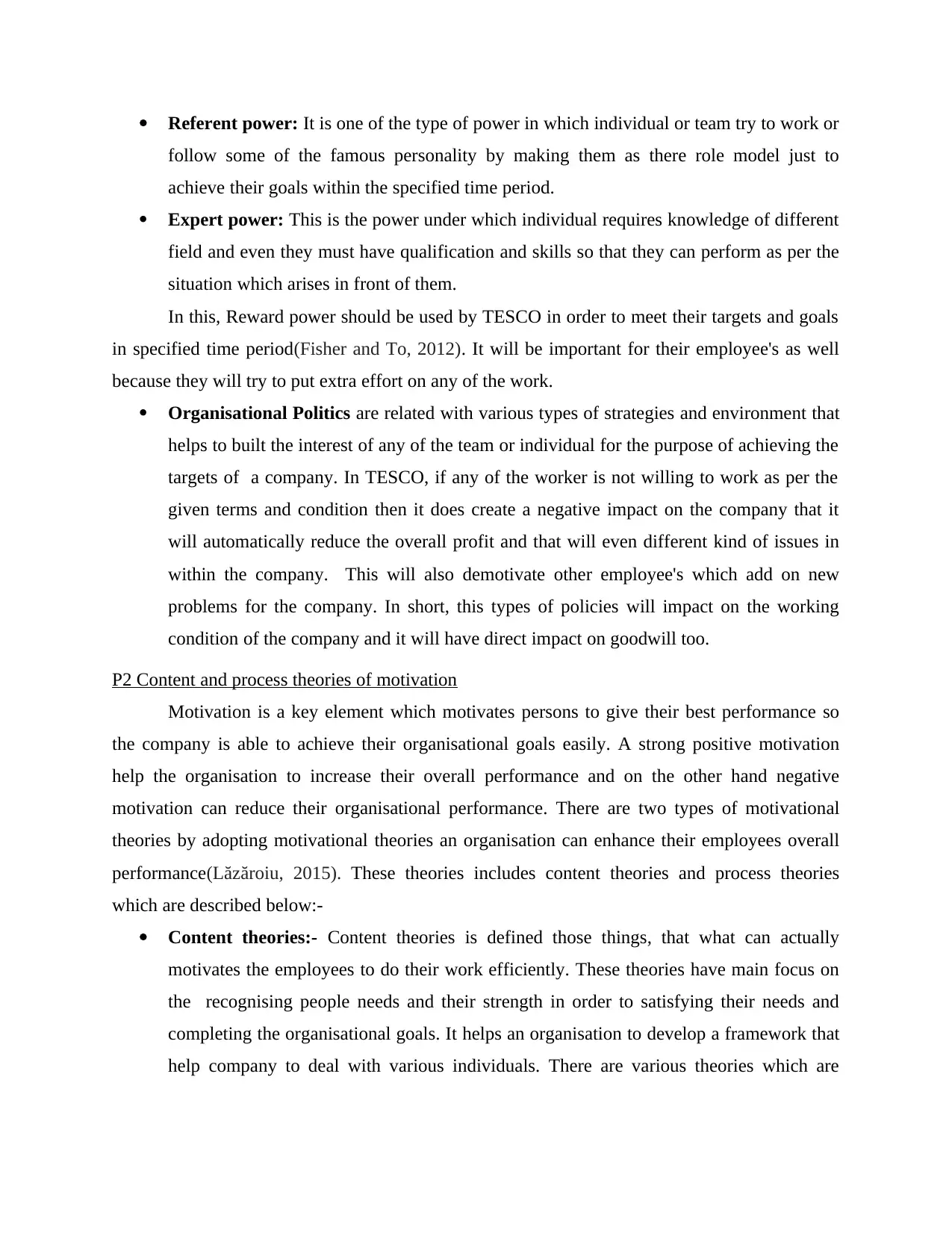
Referent power: It is one of the type of power in which individual or team try to work or
follow some of the famous personality by making them as there role model just to
achieve their goals within the specified time period.
Expert power: This is the power under which individual requires knowledge of different
field and even they must have qualification and skills so that they can perform as per the
situation which arises in front of them.
In this, Reward power should be used by TESCO in order to meet their targets and goals
in specified time period(Fisher and To, 2012). It will be important for their employee's as well
because they will try to put extra effort on any of the work.
Organisational Politics are related with various types of strategies and environment that
helps to built the interest of any of the team or individual for the purpose of achieving the
targets of a company. In TESCO, if any of the worker is not willing to work as per the
given terms and condition then it does create a negative impact on the company that it
will automatically reduce the overall profit and that will even different kind of issues in
within the company. This will also demotivate other employee's which add on new
problems for the company. In short, this types of policies will impact on the working
condition of the company and it will have direct impact on goodwill too.
P2 Content and process theories of motivation
Motivation is a key element which motivates persons to give their best performance so
the company is able to achieve their organisational goals easily. A strong positive motivation
help the organisation to increase their overall performance and on the other hand negative
motivation can reduce their organisational performance. There are two types of motivational
theories by adopting motivational theories an organisation can enhance their employees overall
performance(Lăzăroiu, 2015). These theories includes content theories and process theories
which are described below:-
Content theories:- Content theories is defined those things, that what can actually
motivates the employees to do their work efficiently. These theories have main focus on
the recognising people needs and their strength in order to satisfying their needs and
completing the organisational goals. It helps an organisation to develop a framework that
help company to deal with various individuals. There are various theories which are
follow some of the famous personality by making them as there role model just to
achieve their goals within the specified time period.
Expert power: This is the power under which individual requires knowledge of different
field and even they must have qualification and skills so that they can perform as per the
situation which arises in front of them.
In this, Reward power should be used by TESCO in order to meet their targets and goals
in specified time period(Fisher and To, 2012). It will be important for their employee's as well
because they will try to put extra effort on any of the work.
Organisational Politics are related with various types of strategies and environment that
helps to built the interest of any of the team or individual for the purpose of achieving the
targets of a company. In TESCO, if any of the worker is not willing to work as per the
given terms and condition then it does create a negative impact on the company that it
will automatically reduce the overall profit and that will even different kind of issues in
within the company. This will also demotivate other employee's which add on new
problems for the company. In short, this types of policies will impact on the working
condition of the company and it will have direct impact on goodwill too.
P2 Content and process theories of motivation
Motivation is a key element which motivates persons to give their best performance so
the company is able to achieve their organisational goals easily. A strong positive motivation
help the organisation to increase their overall performance and on the other hand negative
motivation can reduce their organisational performance. There are two types of motivational
theories by adopting motivational theories an organisation can enhance their employees overall
performance(Lăzăroiu, 2015). These theories includes content theories and process theories
which are described below:-
Content theories:- Content theories is defined those things, that what can actually
motivates the employees to do their work efficiently. These theories have main focus on
the recognising people needs and their strength in order to satisfying their needs and
completing the organisational goals. It helps an organisation to develop a framework that
help company to deal with various individuals. There are various theories which are
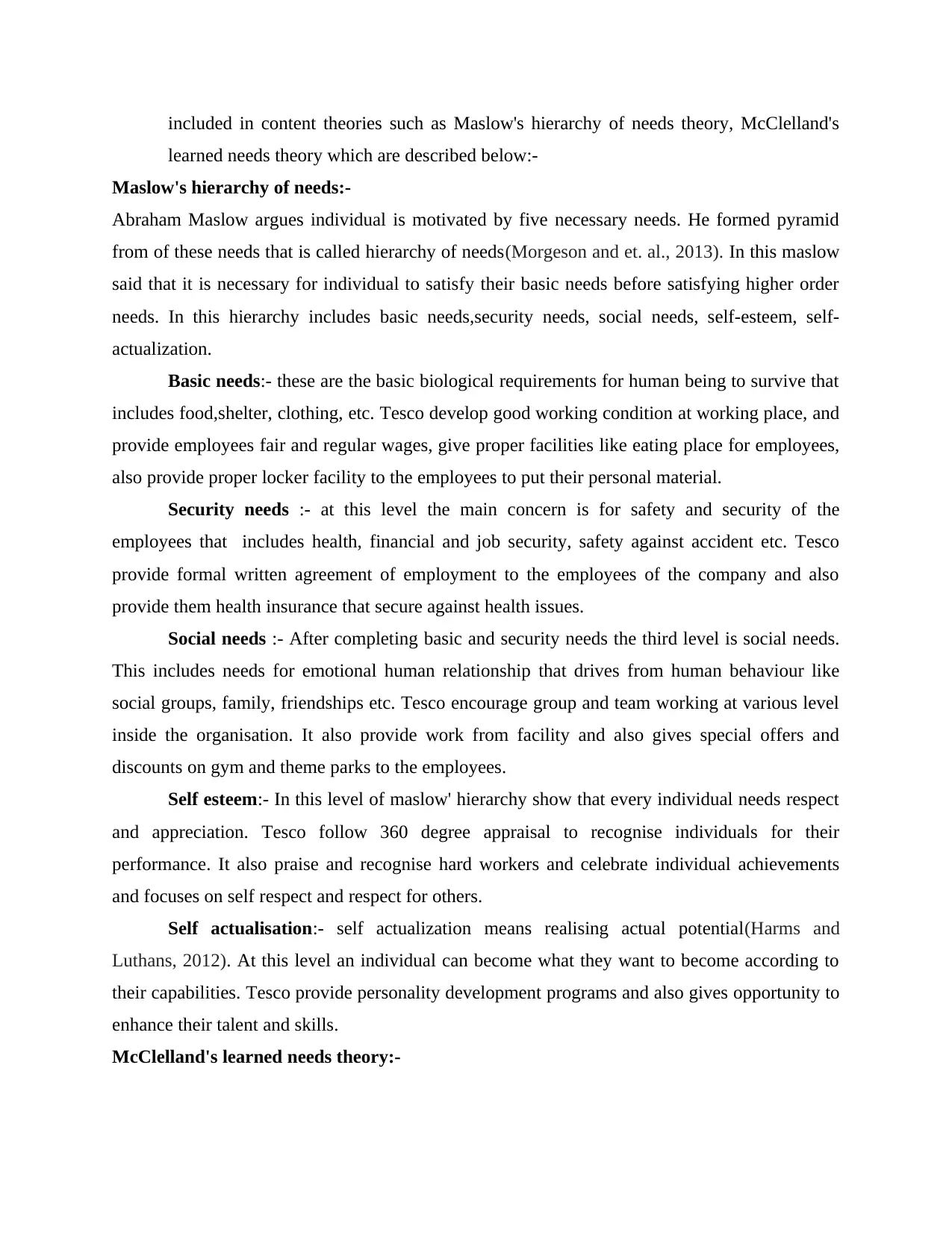
included in content theories such as Maslow's hierarchy of needs theory, McClelland's
learned needs theory which are described below:-
Maslow's hierarchy of needs:-
Abraham Maslow argues individual is motivated by five necessary needs. He formed pyramid
from of these needs that is called hierarchy of needs(Morgeson and et. al., 2013). In this maslow
said that it is necessary for individual to satisfy their basic needs before satisfying higher order
needs. In this hierarchy includes basic needs,security needs, social needs, self-esteem, self-
actualization.
Basic needs:- these are the basic biological requirements for human being to survive that
includes food,shelter, clothing, etc. Tesco develop good working condition at working place, and
provide employees fair and regular wages, give proper facilities like eating place for employees,
also provide proper locker facility to the employees to put their personal material.
Security needs :- at this level the main concern is for safety and security of the
employees that includes health, financial and job security, safety against accident etc. Tesco
provide formal written agreement of employment to the employees of the company and also
provide them health insurance that secure against health issues.
Social needs :- After completing basic and security needs the third level is social needs.
This includes needs for emotional human relationship that drives from human behaviour like
social groups, family, friendships etc. Tesco encourage group and team working at various level
inside the organisation. It also provide work from facility and also gives special offers and
discounts on gym and theme parks to the employees.
Self esteem:- In this level of maslow' hierarchy show that every individual needs respect
and appreciation. Tesco follow 360 degree appraisal to recognise individuals for their
performance. It also praise and recognise hard workers and celebrate individual achievements
and focuses on self respect and respect for others.
Self actualisation:- self actualization means realising actual potential(Harms and
Luthans, 2012). At this level an individual can become what they want to become according to
their capabilities. Tesco provide personality development programs and also gives opportunity to
enhance their talent and skills.
McClelland's learned needs theory:-
learned needs theory which are described below:-
Maslow's hierarchy of needs:-
Abraham Maslow argues individual is motivated by five necessary needs. He formed pyramid
from of these needs that is called hierarchy of needs(Morgeson and et. al., 2013). In this maslow
said that it is necessary for individual to satisfy their basic needs before satisfying higher order
needs. In this hierarchy includes basic needs,security needs, social needs, self-esteem, self-
actualization.
Basic needs:- these are the basic biological requirements for human being to survive that
includes food,shelter, clothing, etc. Tesco develop good working condition at working place, and
provide employees fair and regular wages, give proper facilities like eating place for employees,
also provide proper locker facility to the employees to put their personal material.
Security needs :- at this level the main concern is for safety and security of the
employees that includes health, financial and job security, safety against accident etc. Tesco
provide formal written agreement of employment to the employees of the company and also
provide them health insurance that secure against health issues.
Social needs :- After completing basic and security needs the third level is social needs.
This includes needs for emotional human relationship that drives from human behaviour like
social groups, family, friendships etc. Tesco encourage group and team working at various level
inside the organisation. It also provide work from facility and also gives special offers and
discounts on gym and theme parks to the employees.
Self esteem:- In this level of maslow' hierarchy show that every individual needs respect
and appreciation. Tesco follow 360 degree appraisal to recognise individuals for their
performance. It also praise and recognise hard workers and celebrate individual achievements
and focuses on self respect and respect for others.
Self actualisation:- self actualization means realising actual potential(Harms and
Luthans, 2012). At this level an individual can become what they want to become according to
their capabilities. Tesco provide personality development programs and also gives opportunity to
enhance their talent and skills.
McClelland's learned needs theory:-
⊘ This is a preview!⊘
Do you want full access?
Subscribe today to unlock all pages.

Trusted by 1+ million students worldwide
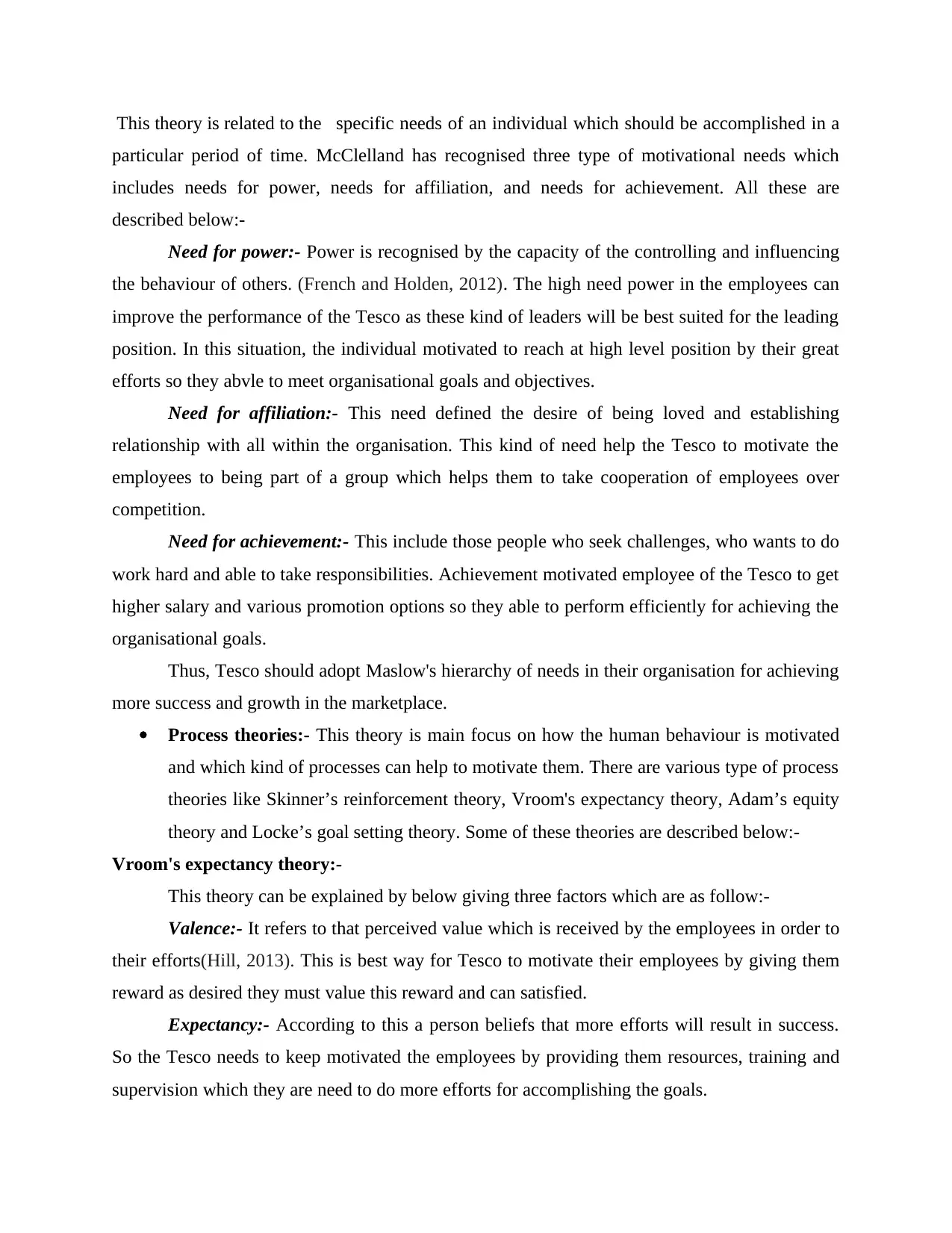
This theory is related to the specific needs of an individual which should be accomplished in a
particular period of time. McClelland has recognised three type of motivational needs which
includes needs for power, needs for affiliation, and needs for achievement. All these are
described below:-
Need for power:- Power is recognised by the capacity of the controlling and influencing
the behaviour of others. (French and Holden, 2012). The high need power in the employees can
improve the performance of the Tesco as these kind of leaders will be best suited for the leading
position. In this situation, the individual motivated to reach at high level position by their great
efforts so they abvle to meet organisational goals and objectives.
Need for affiliation:- This need defined the desire of being loved and establishing
relationship with all within the organisation. This kind of need help the Tesco to motivate the
employees to being part of a group which helps them to take cooperation of employees over
competition.
Need for achievement:- This include those people who seek challenges, who wants to do
work hard and able to take responsibilities. Achievement motivated employee of the Tesco to get
higher salary and various promotion options so they able to perform efficiently for achieving the
organisational goals.
Thus, Tesco should adopt Maslow's hierarchy of needs in their organisation for achieving
more success and growth in the marketplace.
Process theories:- This theory is main focus on how the human behaviour is motivated
and which kind of processes can help to motivate them. There are various type of process
theories like Skinner’s reinforcement theory, Vroom's expectancy theory, Adam’s equity
theory and Locke’s goal setting theory. Some of these theories are described below:-
Vroom's expectancy theory:-
This theory can be explained by below giving three factors which are as follow:-
Valence:- It refers to that perceived value which is received by the employees in order to
their efforts(Hill, 2013). This is best way for Tesco to motivate their employees by giving them
reward as desired they must value this reward and can satisfied.
Expectancy:- According to this a person beliefs that more efforts will result in success.
So the Tesco needs to keep motivated the employees by providing them resources, training and
supervision which they are need to do more efforts for accomplishing the goals.
particular period of time. McClelland has recognised three type of motivational needs which
includes needs for power, needs for affiliation, and needs for achievement. All these are
described below:-
Need for power:- Power is recognised by the capacity of the controlling and influencing
the behaviour of others. (French and Holden, 2012). The high need power in the employees can
improve the performance of the Tesco as these kind of leaders will be best suited for the leading
position. In this situation, the individual motivated to reach at high level position by their great
efforts so they abvle to meet organisational goals and objectives.
Need for affiliation:- This need defined the desire of being loved and establishing
relationship with all within the organisation. This kind of need help the Tesco to motivate the
employees to being part of a group which helps them to take cooperation of employees over
competition.
Need for achievement:- This include those people who seek challenges, who wants to do
work hard and able to take responsibilities. Achievement motivated employee of the Tesco to get
higher salary and various promotion options so they able to perform efficiently for achieving the
organisational goals.
Thus, Tesco should adopt Maslow's hierarchy of needs in their organisation for achieving
more success and growth in the marketplace.
Process theories:- This theory is main focus on how the human behaviour is motivated
and which kind of processes can help to motivate them. There are various type of process
theories like Skinner’s reinforcement theory, Vroom's expectancy theory, Adam’s equity
theory and Locke’s goal setting theory. Some of these theories are described below:-
Vroom's expectancy theory:-
This theory can be explained by below giving three factors which are as follow:-
Valence:- It refers to that perceived value which is received by the employees in order to
their efforts(Hill, 2013). This is best way for Tesco to motivate their employees by giving them
reward as desired they must value this reward and can satisfied.
Expectancy:- According to this a person beliefs that more efforts will result in success.
So the Tesco needs to keep motivated the employees by providing them resources, training and
supervision which they are need to do more efforts for accomplishing the goals.
Paraphrase This Document
Need a fresh take? Get an instant paraphrase of this document with our AI Paraphraser
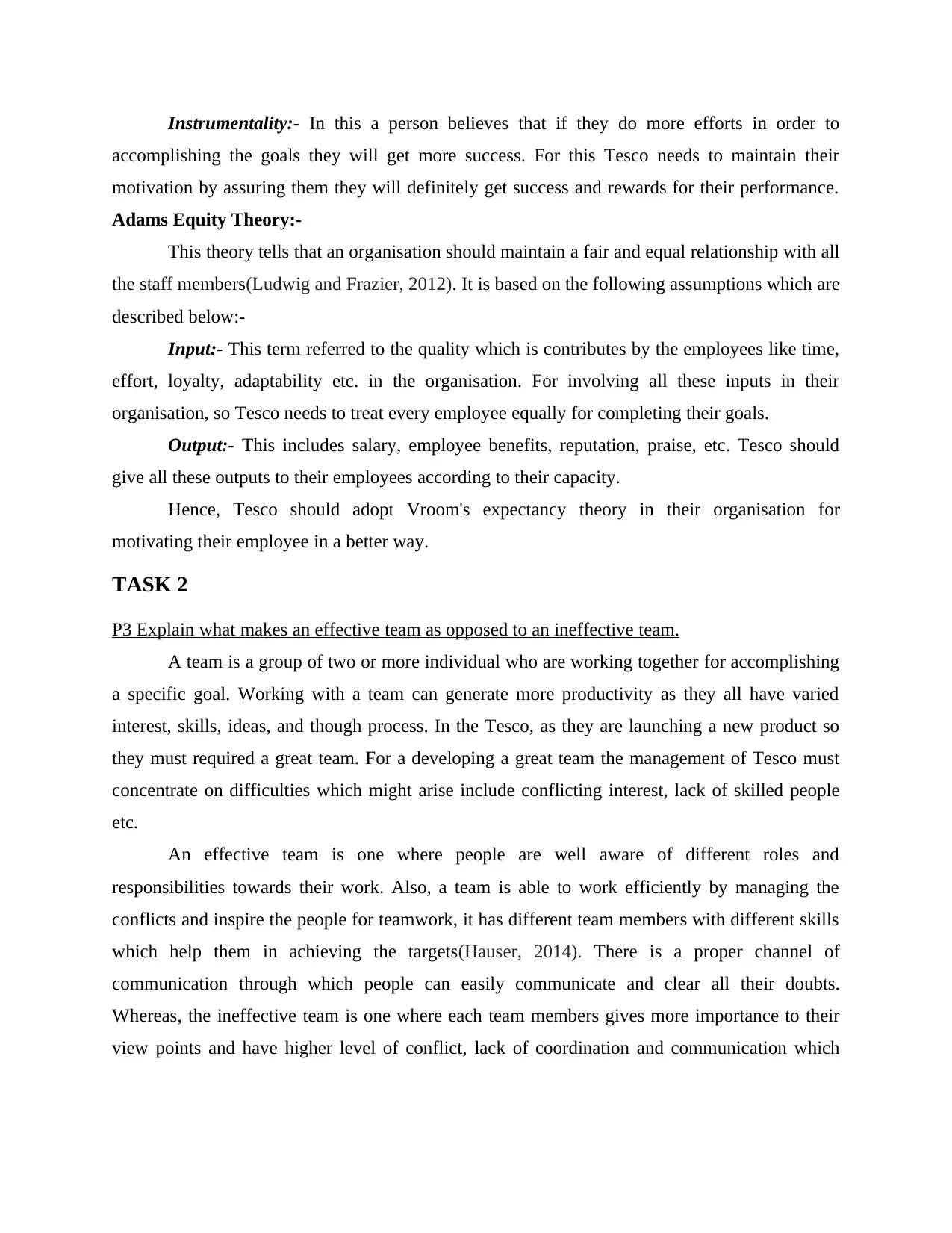
Instrumentality:- In this a person believes that if they do more efforts in order to
accomplishing the goals they will get more success. For this Tesco needs to maintain their
motivation by assuring them they will definitely get success and rewards for their performance.
Adams Equity Theory:-
This theory tells that an organisation should maintain a fair and equal relationship with all
the staff members(Ludwig and Frazier, 2012). It is based on the following assumptions which are
described below:-
Input:- This term referred to the quality which is contributes by the employees like time,
effort, loyalty, adaptability etc. in the organisation. For involving all these inputs in their
organisation, so Tesco needs to treat every employee equally for completing their goals.
Output:- This includes salary, employee benefits, reputation, praise, etc. Tesco should
give all these outputs to their employees according to their capacity.
Hence, Tesco should adopt Vroom's expectancy theory in their organisation for
motivating their employee in a better way.
TASK 2
P3 Explain what makes an effective team as opposed to an ineffective team.
A team is a group of two or more individual who are working together for accomplishing
a specific goal. Working with a team can generate more productivity as they all have varied
interest, skills, ideas, and though process. In the Tesco, as they are launching a new product so
they must required a great team. For a developing a great team the management of Tesco must
concentrate on difficulties which might arise include conflicting interest, lack of skilled people
etc.
An effective team is one where people are well aware of different roles and
responsibilities towards their work. Also, a team is able to work efficiently by managing the
conflicts and inspire the people for teamwork, it has different team members with different skills
which help them in achieving the targets(Hauser, 2014). There is a proper channel of
communication through which people can easily communicate and clear all their doubts.
Whereas, the ineffective team is one where each team members gives more importance to their
view points and have higher level of conflict, lack of coordination and communication which
accomplishing the goals they will get more success. For this Tesco needs to maintain their
motivation by assuring them they will definitely get success and rewards for their performance.
Adams Equity Theory:-
This theory tells that an organisation should maintain a fair and equal relationship with all
the staff members(Ludwig and Frazier, 2012). It is based on the following assumptions which are
described below:-
Input:- This term referred to the quality which is contributes by the employees like time,
effort, loyalty, adaptability etc. in the organisation. For involving all these inputs in their
organisation, so Tesco needs to treat every employee equally for completing their goals.
Output:- This includes salary, employee benefits, reputation, praise, etc. Tesco should
give all these outputs to their employees according to their capacity.
Hence, Tesco should adopt Vroom's expectancy theory in their organisation for
motivating their employee in a better way.
TASK 2
P3 Explain what makes an effective team as opposed to an ineffective team.
A team is a group of two or more individual who are working together for accomplishing
a specific goal. Working with a team can generate more productivity as they all have varied
interest, skills, ideas, and though process. In the Tesco, as they are launching a new product so
they must required a great team. For a developing a great team the management of Tesco must
concentrate on difficulties which might arise include conflicting interest, lack of skilled people
etc.
An effective team is one where people are well aware of different roles and
responsibilities towards their work. Also, a team is able to work efficiently by managing the
conflicts and inspire the people for teamwork, it has different team members with different skills
which help them in achieving the targets(Hauser, 2014). There is a proper channel of
communication through which people can easily communicate and clear all their doubts.
Whereas, the ineffective team is one where each team members gives more importance to their
view points and have higher level of conflict, lack of coordination and communication which
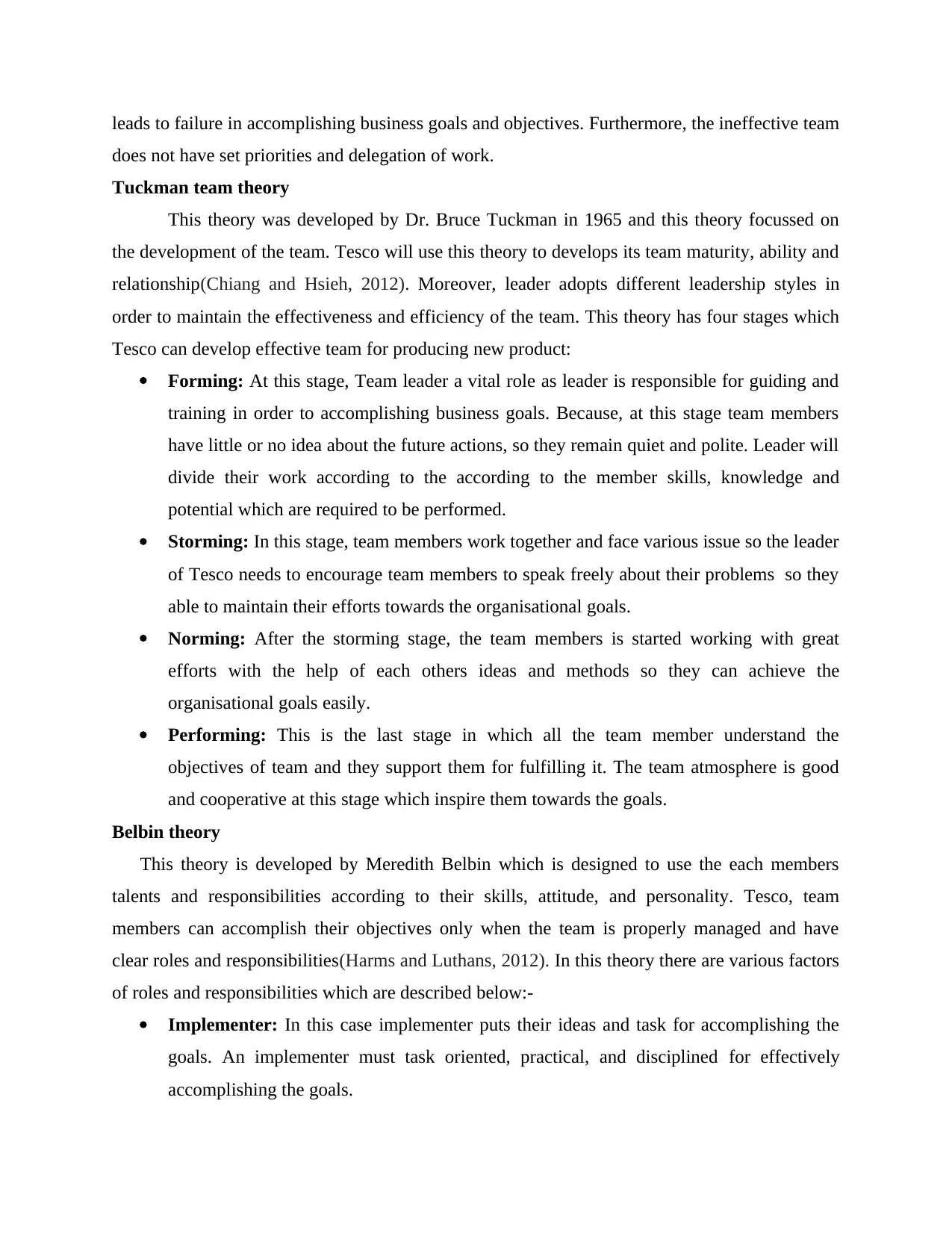
leads to failure in accomplishing business goals and objectives. Furthermore, the ineffective team
does not have set priorities and delegation of work.
Tuckman team theory
This theory was developed by Dr. Bruce Tuckman in 1965 and this theory focussed on
the development of the team. Tesco will use this theory to develops its team maturity, ability and
relationship(Chiang and Hsieh, 2012). Moreover, leader adopts different leadership styles in
order to maintain the effectiveness and efficiency of the team. This theory has four stages which
Tesco can develop effective team for producing new product:
Forming: At this stage, Team leader a vital role as leader is responsible for guiding and
training in order to accomplishing business goals. Because, at this stage team members
have little or no idea about the future actions, so they remain quiet and polite. Leader will
divide their work according to the according to the member skills, knowledge and
potential which are required to be performed.
Storming: In this stage, team members work together and face various issue so the leader
of Tesco needs to encourage team members to speak freely about their problems so they
able to maintain their efforts towards the organisational goals.
Norming: After the storming stage, the team members is started working with great
efforts with the help of each others ideas and methods so they can achieve the
organisational goals easily.
Performing: This is the last stage in which all the team member understand the
objectives of team and they support them for fulfilling it. The team atmosphere is good
and cooperative at this stage which inspire them towards the goals.
Belbin theory
This theory is developed by Meredith Belbin which is designed to use the each members
talents and responsibilities according to their skills, attitude, and personality. Tesco, team
members can accomplish their objectives only when the team is properly managed and have
clear roles and responsibilities(Harms and Luthans, 2012). In this theory there are various factors
of roles and responsibilities which are described below:-
Implementer: In this case implementer puts their ideas and task for accomplishing the
goals. An implementer must task oriented, practical, and disciplined for effectively
accomplishing the goals.
does not have set priorities and delegation of work.
Tuckman team theory
This theory was developed by Dr. Bruce Tuckman in 1965 and this theory focussed on
the development of the team. Tesco will use this theory to develops its team maturity, ability and
relationship(Chiang and Hsieh, 2012). Moreover, leader adopts different leadership styles in
order to maintain the effectiveness and efficiency of the team. This theory has four stages which
Tesco can develop effective team for producing new product:
Forming: At this stage, Team leader a vital role as leader is responsible for guiding and
training in order to accomplishing business goals. Because, at this stage team members
have little or no idea about the future actions, so they remain quiet and polite. Leader will
divide their work according to the according to the member skills, knowledge and
potential which are required to be performed.
Storming: In this stage, team members work together and face various issue so the leader
of Tesco needs to encourage team members to speak freely about their problems so they
able to maintain their efforts towards the organisational goals.
Norming: After the storming stage, the team members is started working with great
efforts with the help of each others ideas and methods so they can achieve the
organisational goals easily.
Performing: This is the last stage in which all the team member understand the
objectives of team and they support them for fulfilling it. The team atmosphere is good
and cooperative at this stage which inspire them towards the goals.
Belbin theory
This theory is developed by Meredith Belbin which is designed to use the each members
talents and responsibilities according to their skills, attitude, and personality. Tesco, team
members can accomplish their objectives only when the team is properly managed and have
clear roles and responsibilities(Harms and Luthans, 2012). In this theory there are various factors
of roles and responsibilities which are described below:-
Implementer: In this case implementer puts their ideas and task for accomplishing the
goals. An implementer must task oriented, practical, and disciplined for effectively
accomplishing the goals.
⊘ This is a preview!⊘
Do you want full access?
Subscribe today to unlock all pages.

Trusted by 1+ million students worldwide
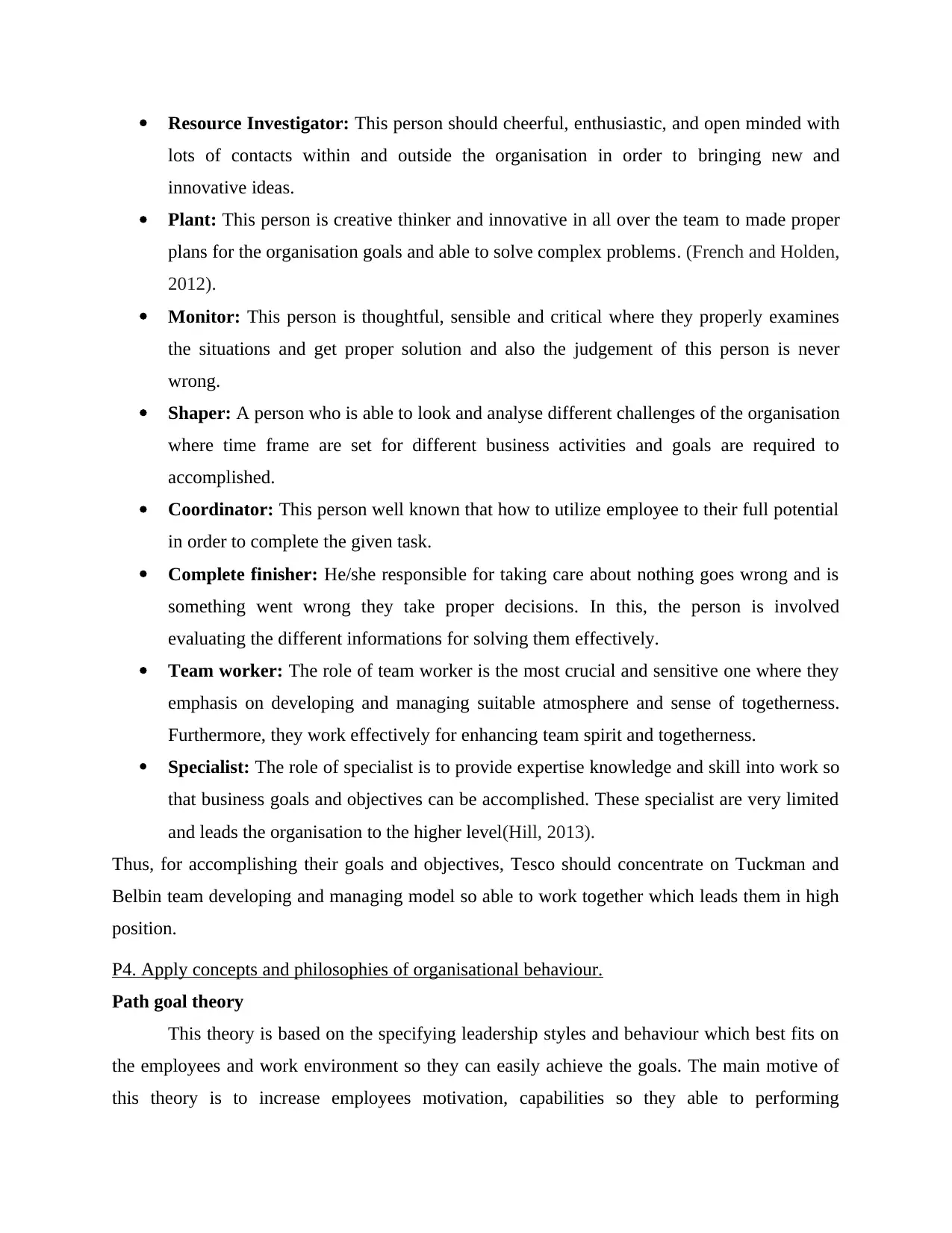
Resource Investigator: This person should cheerful, enthusiastic, and open minded with
lots of contacts within and outside the organisation in order to bringing new and
innovative ideas.
Plant: This person is creative thinker and innovative in all over the team to made proper
plans for the organisation goals and able to solve complex problems. (French and Holden,
2012).
Monitor: This person is thoughtful, sensible and critical where they properly examines
the situations and get proper solution and also the judgement of this person is never
wrong.
Shaper: A person who is able to look and analyse different challenges of the organisation
where time frame are set for different business activities and goals are required to
accomplished.
Coordinator: This person well known that how to utilize employee to their full potential
in order to complete the given task.
Complete finisher: He/she responsible for taking care about nothing goes wrong and is
something went wrong they take proper decisions. In this, the person is involved
evaluating the different informations for solving them effectively.
Team worker: The role of team worker is the most crucial and sensitive one where they
emphasis on developing and managing suitable atmosphere and sense of togetherness.
Furthermore, they work effectively for enhancing team spirit and togetherness.
Specialist: The role of specialist is to provide expertise knowledge and skill into work so
that business goals and objectives can be accomplished. These specialist are very limited
and leads the organisation to the higher level(Hill, 2013).
Thus, for accomplishing their goals and objectives, Tesco should concentrate on Tuckman and
Belbin team developing and managing model so able to work together which leads them in high
position.
P4. Apply concepts and philosophies of organisational behaviour.
Path goal theory
This theory is based on the specifying leadership styles and behaviour which best fits on
the employees and work environment so they can easily achieve the goals. The main motive of
this theory is to increase employees motivation, capabilities so they able to performing
lots of contacts within and outside the organisation in order to bringing new and
innovative ideas.
Plant: This person is creative thinker and innovative in all over the team to made proper
plans for the organisation goals and able to solve complex problems. (French and Holden,
2012).
Monitor: This person is thoughtful, sensible and critical where they properly examines
the situations and get proper solution and also the judgement of this person is never
wrong.
Shaper: A person who is able to look and analyse different challenges of the organisation
where time frame are set for different business activities and goals are required to
accomplished.
Coordinator: This person well known that how to utilize employee to their full potential
in order to complete the given task.
Complete finisher: He/she responsible for taking care about nothing goes wrong and is
something went wrong they take proper decisions. In this, the person is involved
evaluating the different informations for solving them effectively.
Team worker: The role of team worker is the most crucial and sensitive one where they
emphasis on developing and managing suitable atmosphere and sense of togetherness.
Furthermore, they work effectively for enhancing team spirit and togetherness.
Specialist: The role of specialist is to provide expertise knowledge and skill into work so
that business goals and objectives can be accomplished. These specialist are very limited
and leads the organisation to the higher level(Hill, 2013).
Thus, for accomplishing their goals and objectives, Tesco should concentrate on Tuckman and
Belbin team developing and managing model so able to work together which leads them in high
position.
P4. Apply concepts and philosophies of organisational behaviour.
Path goal theory
This theory is based on the specifying leadership styles and behaviour which best fits on
the employees and work environment so they can easily achieve the goals. The main motive of
this theory is to increase employees motivation, capabilities so they able to performing
Paraphrase This Document
Need a fresh take? Get an instant paraphrase of this document with our AI Paraphraser
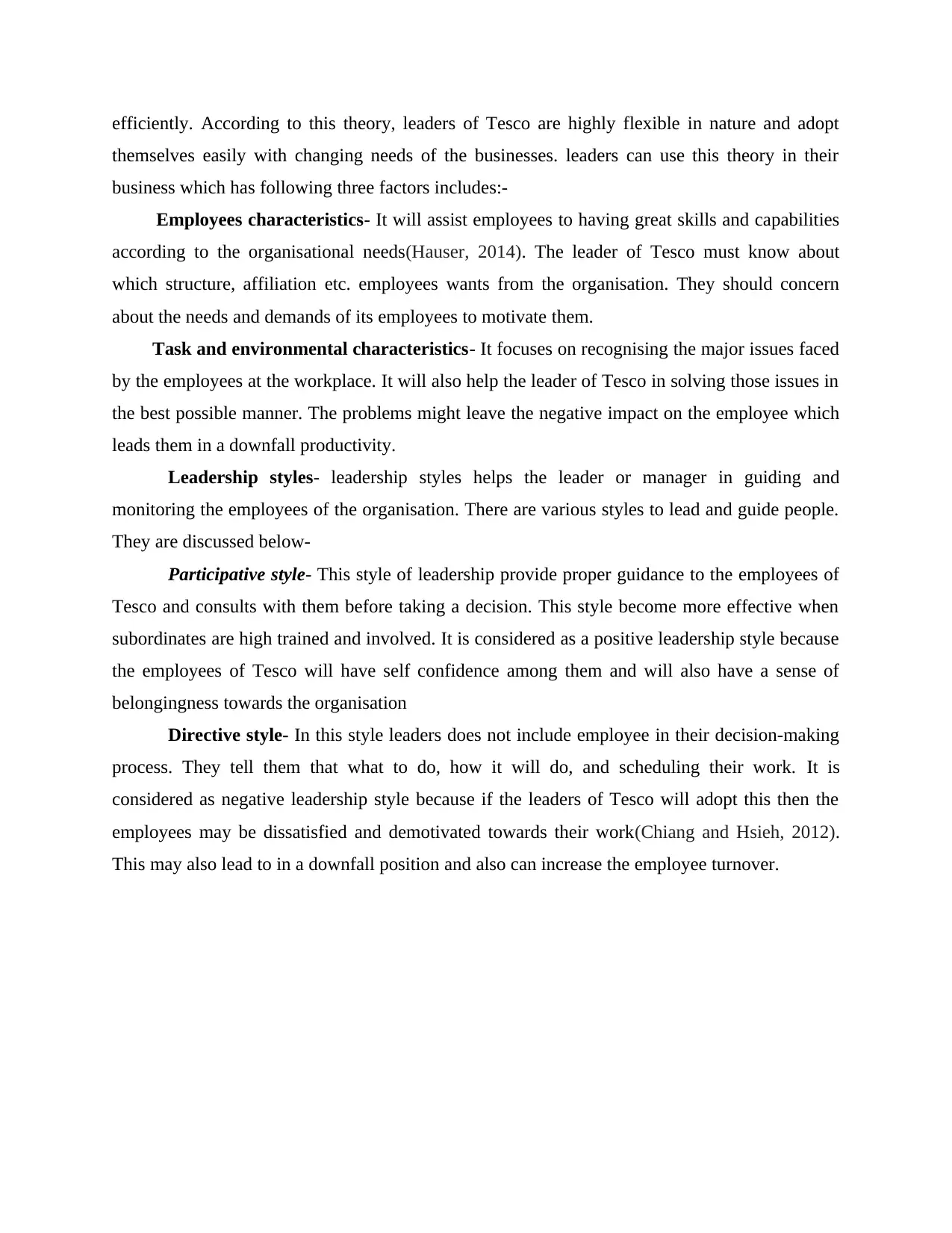
efficiently. According to this theory, leaders of Tesco are highly flexible in nature and adopt
themselves easily with changing needs of the businesses. leaders can use this theory in their
business which has following three factors includes:-
Employees characteristics- It will assist employees to having great skills and capabilities
according to the organisational needs(Hauser, 2014). The leader of Tesco must know about
which structure, affiliation etc. employees wants from the organisation. They should concern
about the needs and demands of its employees to motivate them.
Task and environmental characteristics- It focuses on recognising the major issues faced
by the employees at the workplace. It will also help the leader of Tesco in solving those issues in
the best possible manner. The problems might leave the negative impact on the employee which
leads them in a downfall productivity.
Leadership styles- leadership styles helps the leader or manager in guiding and
monitoring the employees of the organisation. There are various styles to lead and guide people.
They are discussed below-
Participative style- This style of leadership provide proper guidance to the employees of
Tesco and consults with them before taking a decision. This style become more effective when
subordinates are high trained and involved. It is considered as a positive leadership style because
the employees of Tesco will have self confidence among them and will also have a sense of
belongingness towards the organisation
Directive style- In this style leaders does not include employee in their decision-making
process. They tell them that what to do, how it will do, and scheduling their work. It is
considered as negative leadership style because if the leaders of Tesco will adopt this then the
employees may be dissatisfied and demotivated towards their work(Chiang and Hsieh, 2012).
This may also lead to in a downfall position and also can increase the employee turnover.
themselves easily with changing needs of the businesses. leaders can use this theory in their
business which has following three factors includes:-
Employees characteristics- It will assist employees to having great skills and capabilities
according to the organisational needs(Hauser, 2014). The leader of Tesco must know about
which structure, affiliation etc. employees wants from the organisation. They should concern
about the needs and demands of its employees to motivate them.
Task and environmental characteristics- It focuses on recognising the major issues faced
by the employees at the workplace. It will also help the leader of Tesco in solving those issues in
the best possible manner. The problems might leave the negative impact on the employee which
leads them in a downfall productivity.
Leadership styles- leadership styles helps the leader or manager in guiding and
monitoring the employees of the organisation. There are various styles to lead and guide people.
They are discussed below-
Participative style- This style of leadership provide proper guidance to the employees of
Tesco and consults with them before taking a decision. This style become more effective when
subordinates are high trained and involved. It is considered as a positive leadership style because
the employees of Tesco will have self confidence among them and will also have a sense of
belongingness towards the organisation
Directive style- In this style leaders does not include employee in their decision-making
process. They tell them that what to do, how it will do, and scheduling their work. It is
considered as negative leadership style because if the leaders of Tesco will adopt this then the
employees may be dissatisfied and demotivated towards their work(Chiang and Hsieh, 2012).
This may also lead to in a downfall position and also can increase the employee turnover.
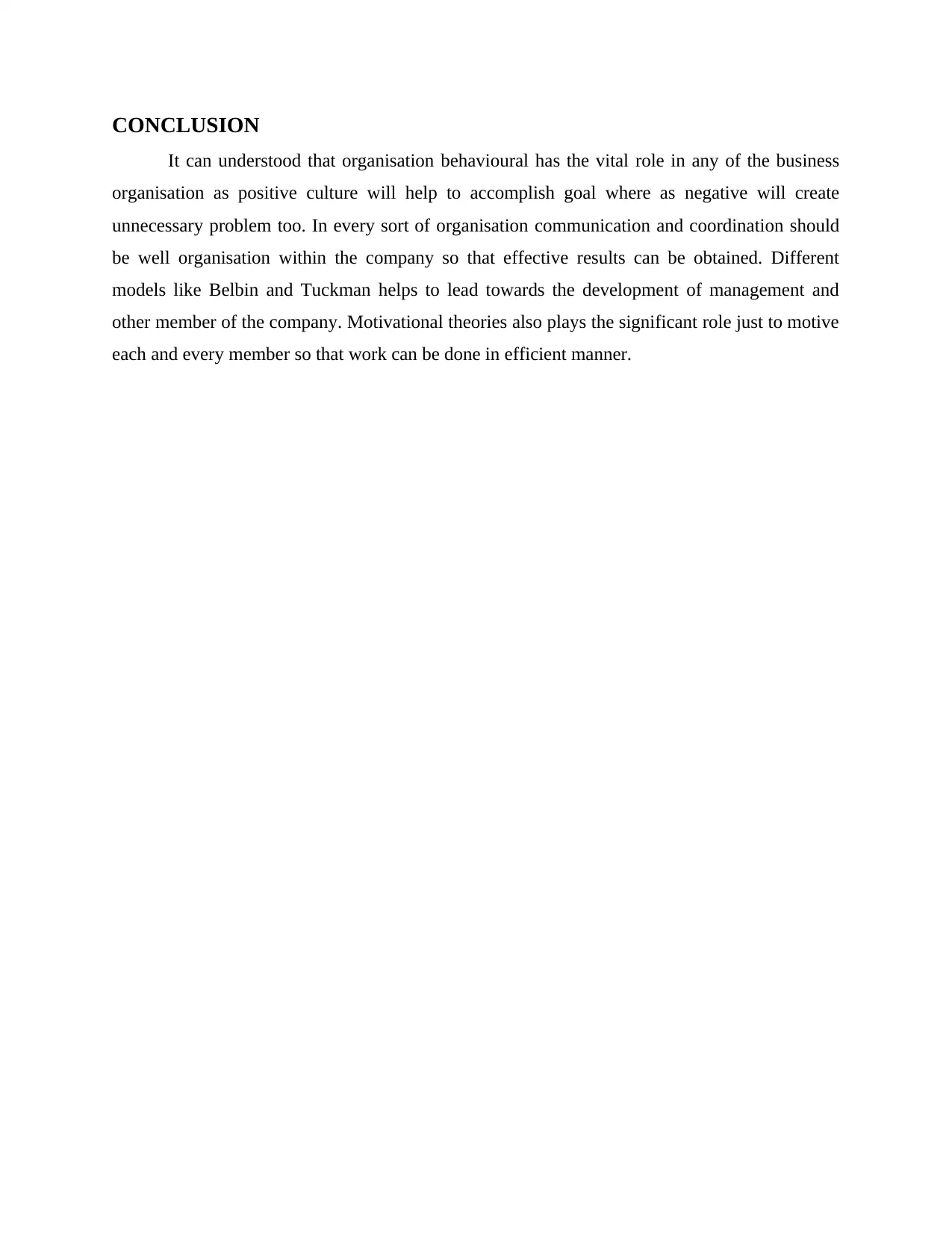
CONCLUSION
It can understood that organisation behavioural has the vital role in any of the business
organisation as positive culture will help to accomplish goal where as negative will create
unnecessary problem too. In every sort of organisation communication and coordination should
be well organisation within the company so that effective results can be obtained. Different
models like Belbin and Tuckman helps to lead towards the development of management and
other member of the company. Motivational theories also plays the significant role just to motive
each and every member so that work can be done in efficient manner.
It can understood that organisation behavioural has the vital role in any of the business
organisation as positive culture will help to accomplish goal where as negative will create
unnecessary problem too. In every sort of organisation communication and coordination should
be well organisation within the company so that effective results can be obtained. Different
models like Belbin and Tuckman helps to lead towards the development of management and
other member of the company. Motivational theories also plays the significant role just to motive
each and every member so that work can be done in efficient manner.
⊘ This is a preview!⊘
Do you want full access?
Subscribe today to unlock all pages.

Trusted by 1+ million students worldwide
1 out of 13
Related Documents
Your All-in-One AI-Powered Toolkit for Academic Success.
+13062052269
info@desklib.com
Available 24*7 on WhatsApp / Email
![[object Object]](/_next/static/media/star-bottom.7253800d.svg)
Unlock your academic potential
Copyright © 2020–2026 A2Z Services. All Rights Reserved. Developed and managed by ZUCOL.





